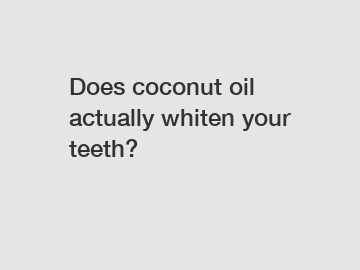Does coconut oil actually whiten your teeth?
Does coconut oil actually whiten your teeth?
Coconut oil has gained immense popularity in recent years due to its numerous health benefits. From cooking to skincare, this versatile oil has been touted as a natural remedy for a wide range of ailments. One claim that has been making the rounds is that coconut oil can whiten your teeth. But is there any truth to this statement? Let's delve deeper and explore the science behind this alleged teeth-whitening property of coconut oil.
1. The antibacterial properties of coconut oil:

Coconut oil contains lauric acid, which has strong antibacterial properties. When it comes into contact with the bacteria in our mouths, it can help eliminate harmful microbes that contribute to tooth decay and gum disease. This antibacterial action may indirectly contribute to a brighter smile by promoting better oral health.
2. Oil pulling - a traditional practice:
Oil pulling is an ancient technique used for oral hygiene that involves swishing oil in the mouth for several minutes. Traditionally, sesame oil was predominantly used for this practice, but coconut oil has gained popularity as a substitute. Oil pulling helps remove plaque and bacteria from the teeth, gums, and tongue, improving oral health. Some proponents claim that it can also help whiten teeth, but scientific evidence supporting this claim is limited.
3. Lack of concrete scientific evidence:
While there are numerous anecdotal reports and claims about coconut oil's teeth-whitening properties, scientific studies are scarce. Very few studies have specifically investigated the effect of coconut oil on teeth whitening. Due to the lack of concrete evidence, it is difficult to make a definitive conclusion about the efficacy of coconut oil for this purpose.
4. Oil pulling technique and duration:
If you decide to try coconut oil for teeth whitening, it is essential to use the correct technique and be consistent. Oil pulling is typically done by swishing a tablespoon of oil in the mouth for 10-20 minutes. This prolonged swishing allows the oil to reach all areas of the mouth, including the teeth, gums, and tongue. However, it is crucial to note that oil pulling should not replace regular brushing and flossing, which are key to maintaining good oral hygiene.
5. Alternative natural teeth whitening methods:
While the teeth-whitening properties of coconut oil may be inconclusive, several other natural remedies have shown promise. For example, baking soda has mild abrasive properties that can help remove surface stains on teeth. Additionally, activated charcoal has gained popularity as a natural teeth whitener, although its long-term effects are still being studied.
In conclusion, the teeth-whitening properties of coconut oil remain a topic of debate. While there is some evidence supporting its antibacterial properties and potential benefits for oral health, there is currently inadequate scientific research specifically focused on coconut oil's teeth-whitening abilities. Therefore, it is essential to approach these claims with caution. If you choose to try coconut oil or any other natural remedy for teeth whitening, consistency and maintaining regular oral hygiene practices are key. It is always advisable to consult with a dentist before incorporating any new oral hygiene practices into your routine.
If you want to learn more, please visit our website teeth whitening strip factories, pap strips teeth whitening odm, oem Teeth Whitening Strips factory.

Comments